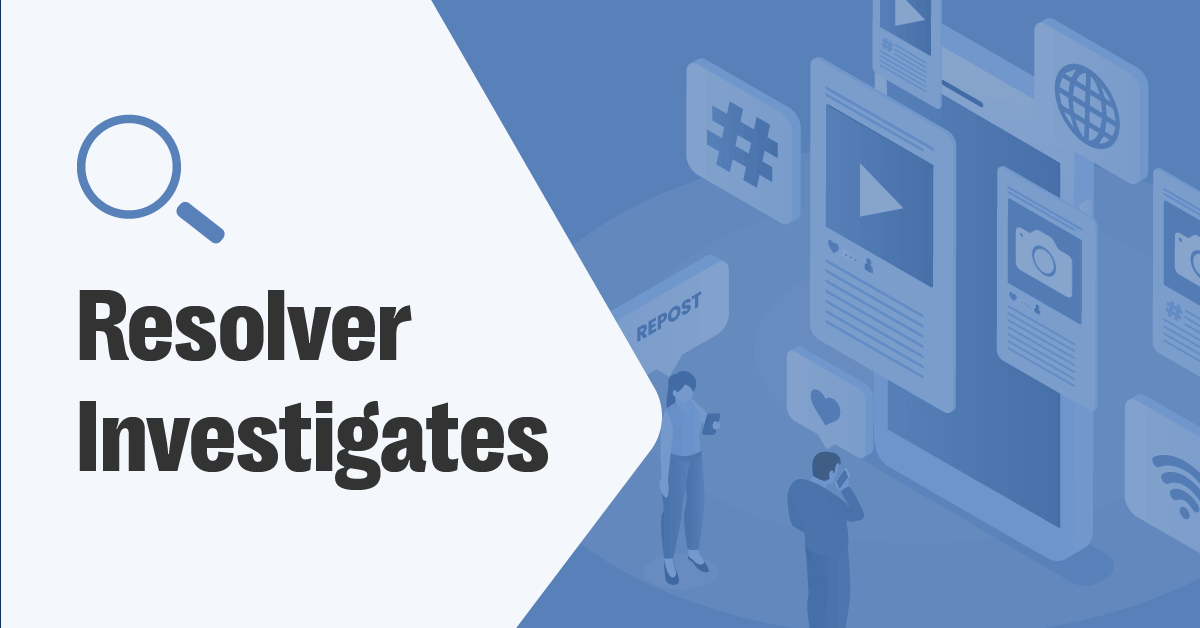What happens when your spokesperson becomes the story — for all the wrong reasons?
When Emilia Pérez debuted to critical acclaim and Oscar buzz, few predicted its star would become the focus of a growing online controversy — one that pulled the film, its studio, and its messaging into the crossfire. However, the movies award season trajectory was upended in days when resurfaced tweets from lead actress Karla Sofía Gascón triggered a viral backlash.
The posts — deemed racist, xenophobic and Islamophobic across ideological lines — sparked tens of thousands of mentions and accumulated millions of views across mainstream and alt-tech platforms. This wasn’t just a viral PR crisis — it was a preventable brand reputation risk.
With the right social listening and online risk intelligence, this kind of social media backlash can be anticipated, tracked, and managed before it ever makes headlines.
Resolver conducted a retrospective analysis of the Emilia Pérez backlash, tracking over 52,000 mentions across platforms between January 29 and March 24, 2025. This analysis of the online discourse provides a timeline to the backlash, illustrating how the conversation escalated —and where a real-time risk intelligence approach could have made a difference.
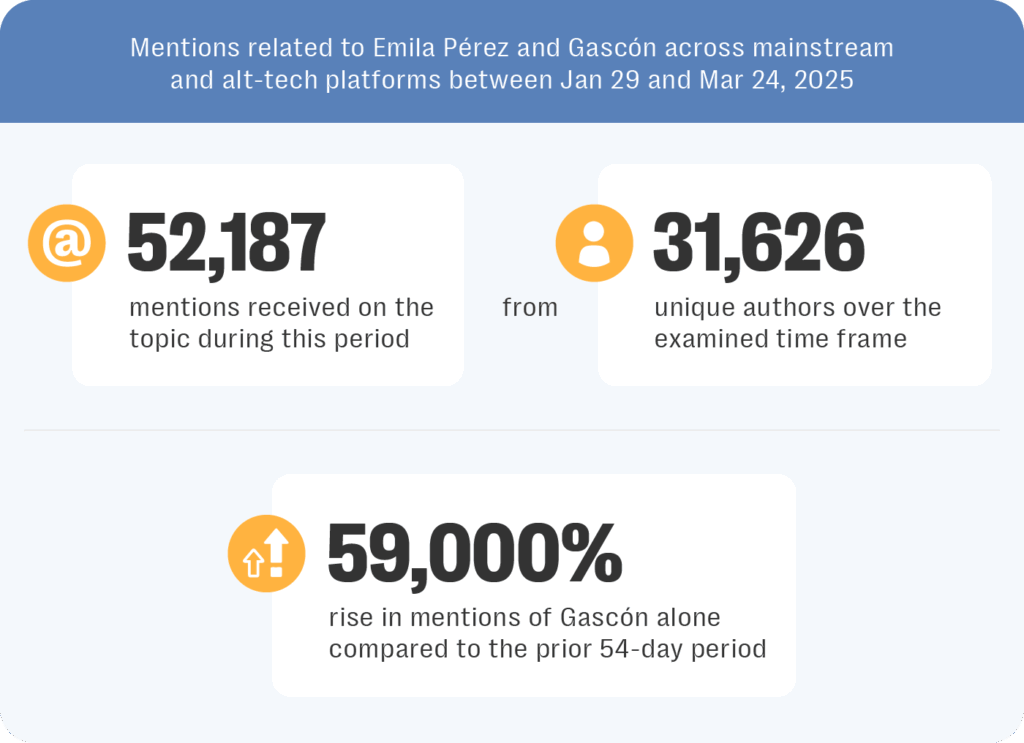
This rapid brand reputation risks raised by the social media backlash demonstrates how quickly online communities can reshape public perception of brands. With Resolver’s services in place, the brand would have received early alerts, narrative tracking, and situational reports aligned to key moments in the backlash lifecycle.
Our social listening and online risk intelligence service also includes the option of Resolver’s Digital Footprint Reports that provide brands a focused analysis of an individual’s online reputation, spotlighting risks that could impact partnerships, brand alignment, or professional affiliations.
How Social Media Backlash Derailed an Oscar Campaign
Every year, Academy members vote across 23 categories in the months preceding the ceremony. While only members can vote on which film wins in each category, public commentary and online discourse undoubtedly shape perceptions that influence voting behaviour.
Studios routinely invest millions in high-visibility campaigns to build public support and sway industry sentiment—often months before award season begins. However, the growing influence of critical online discourse also leaves these studios increasingly vulnerable to social media backlash targeting their films and talent—a risk that magnifies during award season between January and March each year.
Once Gascón’s old tweets re-emerged, online commentators made a wider online campaign against the movie, pointing out that Gascón’s old statements highlighted perceived issues in the movie’s portrayal of Mexico and trans people. With many commentators emphasizing the perceived contradiction between Gascón’s public identity as a trans actress and the nature of her posts exhibiting discrimination towards another marginalized community.
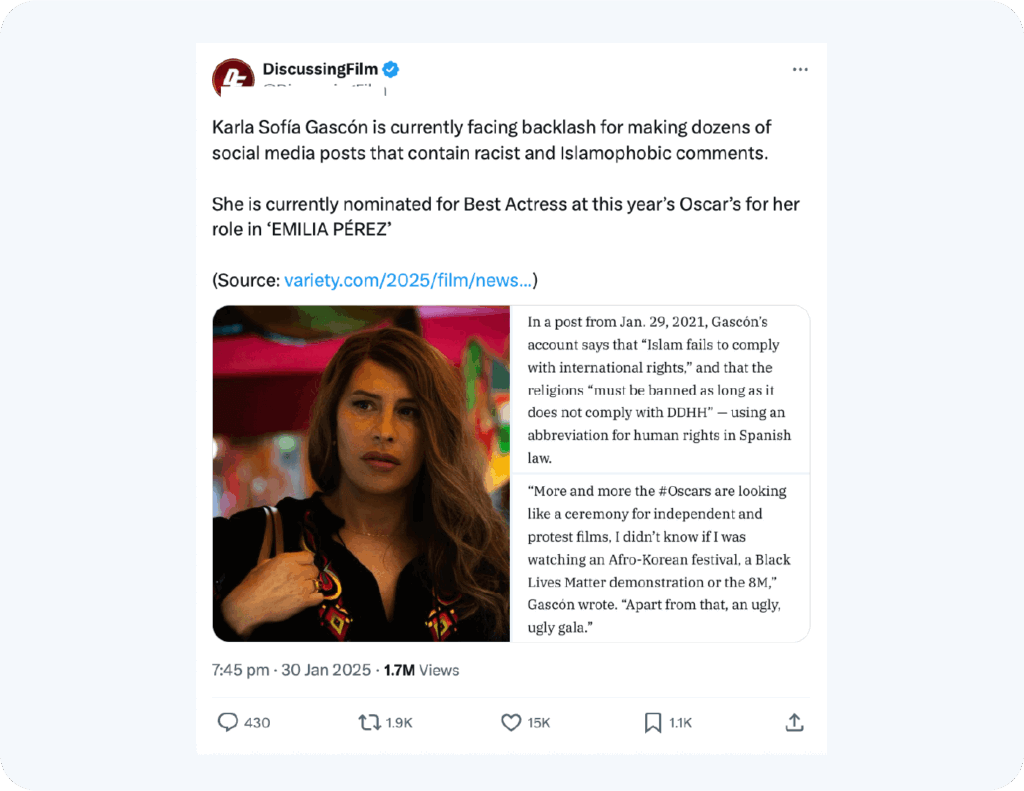
Social media posts from media outlets highlighting the controversy accrued millions of views online.
In response, Gascón deleted the old tweets and issued a public apology via social media, though she later removed the post. She also expressed her regret over the comments in an interview with CNN Español on February 2. As mainstream media amplified the story, speculation arose about Gascón potentially losing her Best Actress nomination, though ultimately this did not occur.
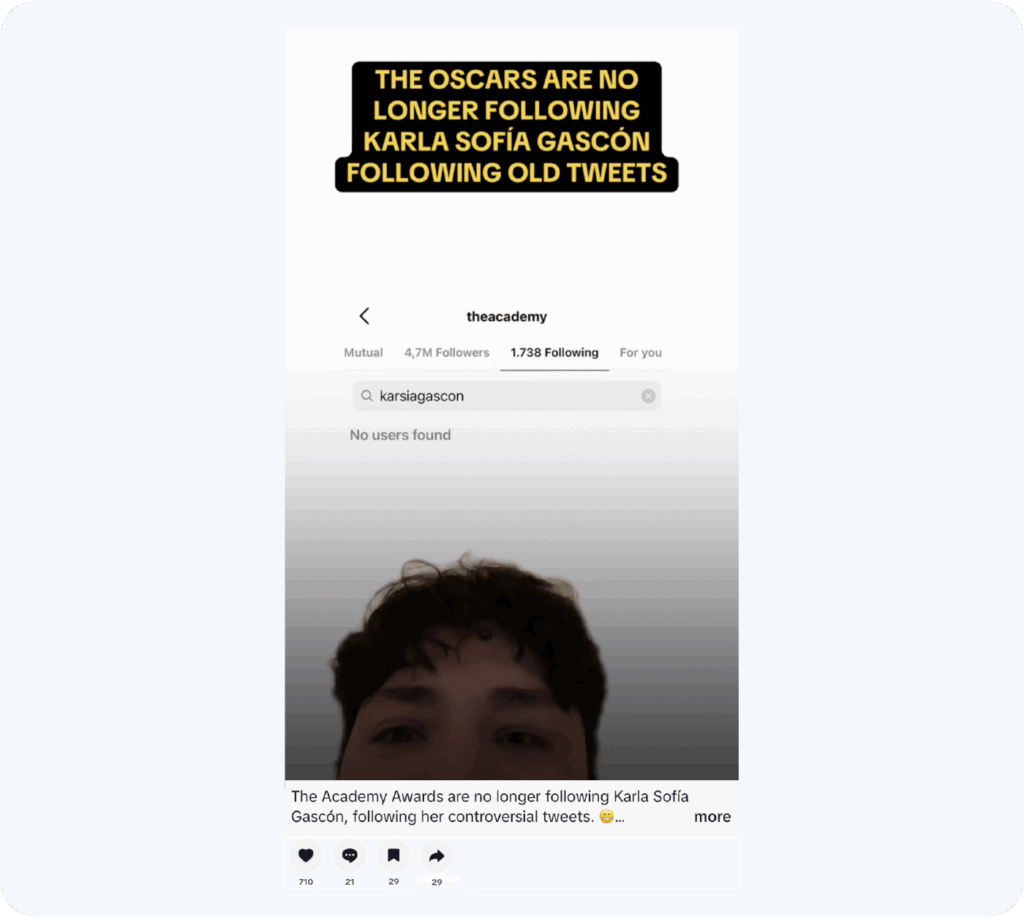
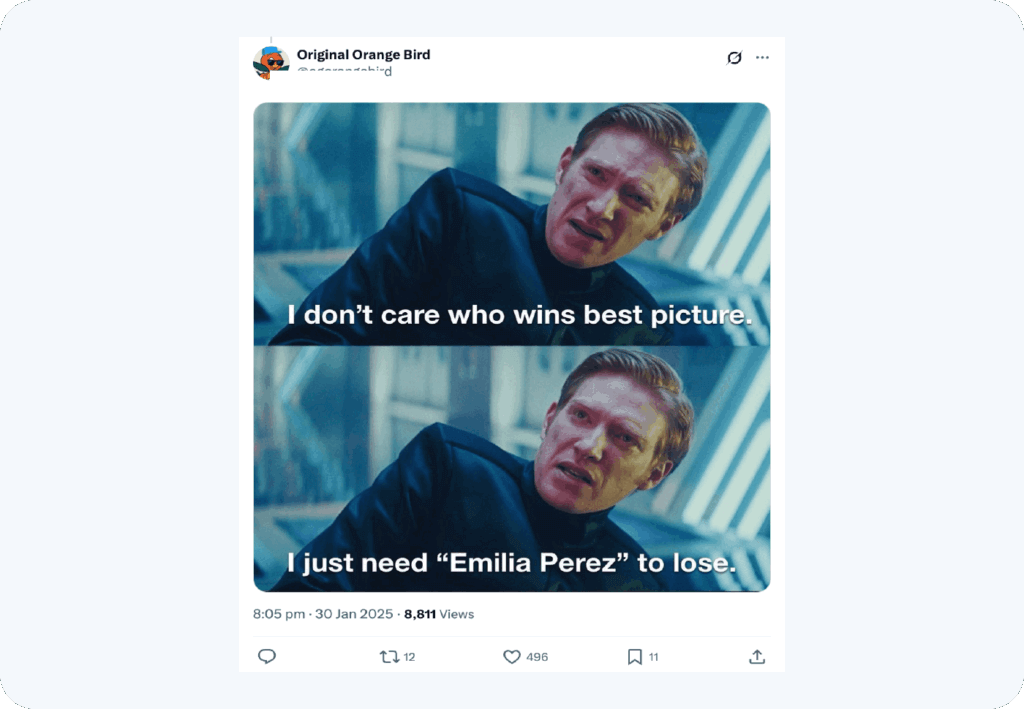
Users shared memes and comedic posts across multiple social platforms that highlighted the controversy and criticized the studio and movie for their association with the performer.
Despite these interventions, online activity surged again between February 6 and 7, suggesting the social media backlash had not yet subsided. The brand reputation risks created by Gascón’s old tweets stems from the seeming misalignment between the performers’ values, and the values the public expected them to hold. When this happens, brands can draw criticism from both ends of the political aisle.
The social media backlash was ideologically broad. Progressive commentators condemned the tweets as discriminatory, questioning their alignment with the film’s themes of justice and inclusion. Meanwhile, critics from more conservative and “anti-woke” communities framed the incident as evidence of double standards—arguing that the film’s messaging conflicted with the behaviour of its lead actress.
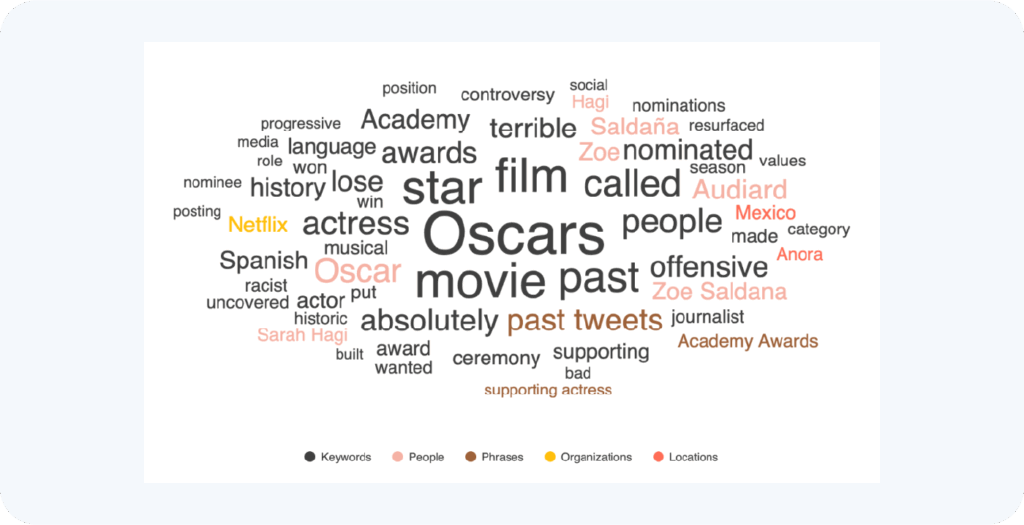
A word graph of the dataset of over 52,000 mentions related to the controversy revealed that users speculating on its effect on the movie’s Oscar chances dominated the online discourse.
Netflix made no public statement about Gascón, who declined to attend other award ceremonies that she had been nominated for, including the Spanish Goyas and the BAFTAs, prompting speculation if she would still attend the Oscars ceremony.
On March 2, 2025, Gascón did attend the Oscars, but did not win the best actress award. Emilia Pérez received only two awards: Best Supporting Actress (Zoe Saldaña) and Best Original Song (El Mal). In the weeks after the ceremony, mainstream media continued to reference the controversy but online discussion had largely subsided. However, by this time the damage had already been done.
This case underscores the value of mitigating brand reputation risks through engaging in pre-emptive digital risk assessments in high-stakes promotional cycles—particularly for public-facing talent.
Tracking Social Media Backlash in Real-Time
The following timeline outlines key moments in the social media backlash following the resurfacing of Karla Sofía Gascón’s tweets, as tracked by Resolver between January 29 and March 24, 2025. Each event illustrates the volatility of brand reputation risks during award season—and the value of real-time alerting and contextual reporting.
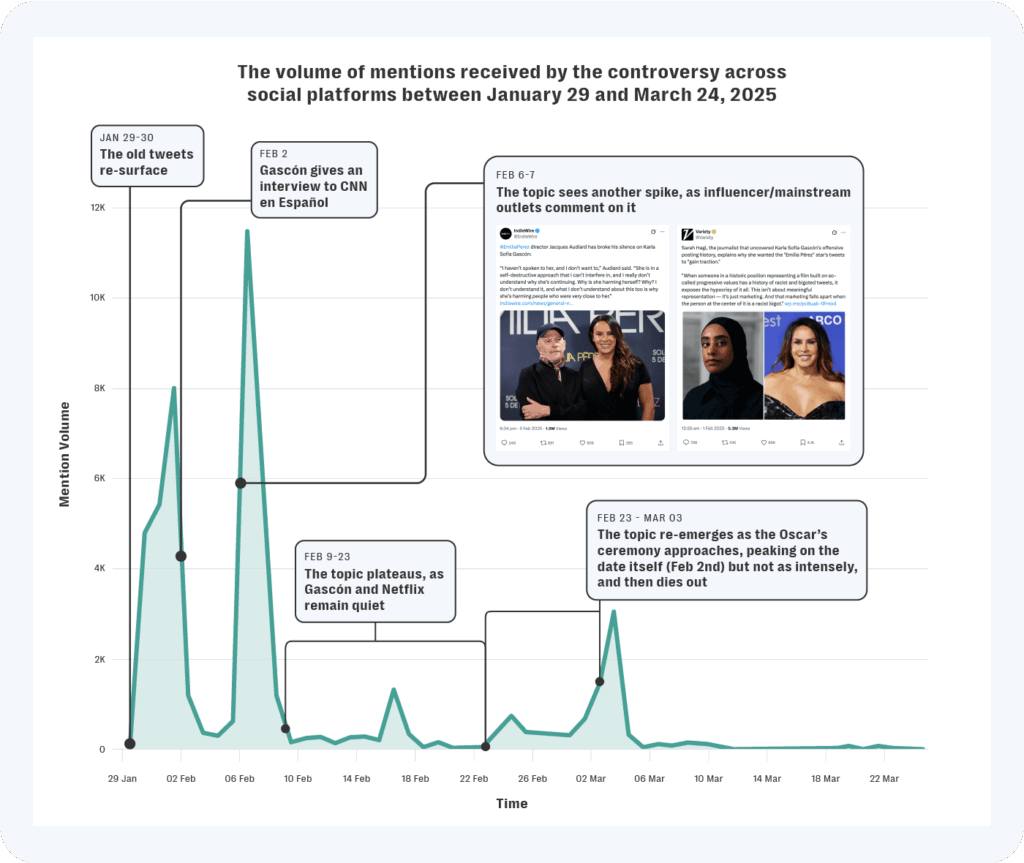
- Jan 30, 2025: Controversial tweets from Gascón re-emerge. Online engagement surges, with over 38,000 unique mentions between January 30 and February 7. Resolver would have alerted this as soon as the post had been shared online, and within 120 minutes provided a situation report as the crisis escalated.
- Feb 2, 2025: Gascón attempts to defuse the situation via a televised interview with CNN Español. The response is widely perceived as ineffective, leading to renewed criticism. Resolver would continue monitoring for high-engagement posts and provide alerts as necessary.
- Feb 8–23, 2025: Public attention declines. Neither Netflix nor Gascón issue further statements. Gascón skips the Goya Awards (Feb 8) and BAFTAs (Feb 16), prompting further speculation. Resolver would continue to monitor for any escalations and provide a Situation Report about the crisis.
- Feb 24 – Mar 2, 2025: Topic resurfaces in the lead-up to the Oscars. Conversation around the old tweets remains present, though the social media backlash is overshadowed by broader awards speculation. Resolver continues real-time monitoring and provides context on evolving narratives in the form of Situation Reports.
- Mar 2, 2025: – Oscars Night Gascón attends the ceremony but does not win Best Actress. Emilia Pérez secures only two awards. Online mentions rise modestly, then decline sharply. Resolver delivers summary reporting on residual impact and topic resolution.
Mitigating Risks with Social Listening and Online Risk Intelligence
While established movie stars are accustomed to having their lives publicly scrutinized by media outlets and users across social platforms, for emerging performers like Karla Sofía Gascón this scrutiny often arrives only after they gain visibility through a high-profile production or promotional campaign.
In such cases, it is common for users on social platforms to investigate past comments, associations and public appearances by the performer in search of perceived inconsistencies or controversial content. This user-driven investigation often accelerates when the performer is associated with a film or campaign that is seen as politically or culturally significant.
Resolver’s Digital Footprint Reports, delivered as part of our Social Listening and Online Risk Intelligence Services, help brands pre-empt reputational risk through structured reviews of a public figure’s online presence. For Emilia Pérez, a comprehensive audit of the performer’s social media footprint would have surfaced these posts before the start of award season, or potentially at the time of casting for the film, helping the studio avoid any negative surprises further down the line.
Additionally, Resolver provides ongoing real-time alerting, monitoring social and online media for emerging controversies, viral posts, or narrative shifts that could signal a brand reputation risk. This dual approach—pre-emptive assessment and live monitoring—ensures brands are equipped to both identify risks before they escalate and respond rapidly when they do.
Conclusion
For brands, one of the most important decisions to make when choosing a spokesperson is making sure that their values are aligned with the values of the brand itself. Otherwise, audiences are quick to notice the mismatch and to comment about it online, leading to multiple possible negative consequences, from losing awards, to tumbling share prices. The Gascón case is a reminder that reputational risks are shaped, accelerated, and reinterpreted in real time by online communities.
In high-stakes environments like award seasons, product launches, or public campaigns, preparedness and proactivity matters. Resolver equips brands to make informed decisions before reputational risks take shape—and to act decisively when they do.
Want to know how a controversy could impact your campaign before it hits the headlines? Resolver’s Digital Footprint Reports help brands stay ahead of reputational risks — online, in real time, and globally.

